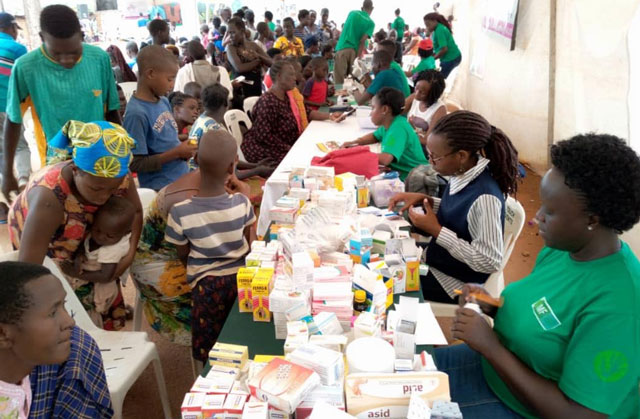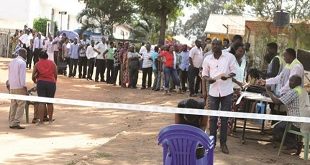
Why our hospitals lack ambulances as public officials indulge themselves in fancy four-wheel drive vehicles
THE LAST WORD | ANDREW M. MWENDA | Last week someone close to me had a medical emergency in Mubende referral hospital. A child died inside the womb of his fiancé. The only ambulance the hospital has had a mechanical fault that has not been fixed yet. So he could not evacuate his fiancé to Kampala.
However, a doctor in charge said they could handle the emergency and therefore no need for an evacuation. An hour later the young lady had been helped to deliver the dead baby. I was pleased but also angry. How can a regional referral hospital have one ambulance? I also learnt Mubende district has only one private ambulance.
If you are a knowledgeable Ugandan citizen and taxpayer, you get extremely angry at these things; especially because our country can do better. The last time the Ministry of Finance did a government motor vehicles census was 2006. They found the ministry of health had 3,000 four-wheel drive vehicles at its headquarters for its officials. And this waste cuts across all government ministries and agencies. These days one is sickened by the number of police or army escort vehicles that accompany public officials with sirens as they drive four-wheels; pushing everyone else off the road during rush hour. This is government by self-indulgence of the elite.
Yet I am also aware that the ministry of health has been doing a great job of renovating and re-equipping regional and district referral hospitals. I am also aware of the increasing access of the public to essential medicines. For instance, the percentage of health facilities without stock-outs of any of the six essential drugs has improved from 43% in 2010 to 95% today. Many indicators have greatly improved over the last nine years: child, infant and maternal mortality, the percentage of women receiving antenatal care during pregnancy and giving birth in hospitals, immunisation and vaccination against common diseases, etc.
So while as a citizen I appreciate the achievements of our health sector, and also while I am not a fan of publically funded medical care in a poor country, I still believe our government can do better for its citizens. It makes no sense for a country without ambulances at public hospitals to have tens of thousands of expensive four-wheel drive vehicles for public officials to drive to office, their homes, seminars and workshops. No wonder many Ugandans are angry. To make a bad situation worse, government spends huge sums sending public officials abroad for medical attention.
The behavior of the government of Uganda baffles me. By every measure, Uganda is an increasingly democratising country. There is greater political participation and even greater political contestation. Although President Yoweri Museveni likes to cut the image of a strong and invulnerable presidential monarch, every election does threaten his survival. This was especially so in the 2006 and 2016 presidential elections when his arch rival, Dr Kizza Besigye, came close to upsetting the apple cart. More so, over 65% of all incumbent legislators are voted out of office in every election.
This high attrition rate of legislators in Uganda is a sign that our citizens do actually hold elected officials to account. Indeed, Uganda is very different from mature democracies like the USA where in any election, less than 10% of incumbent legislators lose their seats. In fact this means USA has a deeply entrenched political class to resist reform. The high anti incumbency bias in Uganda suggests our MPs would be more sensitive to public needs and therefore more responsiveness to citizens’ needs. Why then does government of Uganda continue to indulge the elite instead of serving the citizens?
It seems the productive margin in government’s search for votes does not lie in serving the citizens (even though that is part of the calculus) but in feathering the nests of elites. I suspect this is because of the incentives created by structural circumstances in a poor, ethnically diverse peasant society. Ethnic diversity creates a desire by different ethnic groups to see the presence of one of their own in power as actual representation. Power is seen as driving in big cars, living in big houses and the ability to be generous to one’s co-ethnics.
 The Independent Uganda: You get the Truth we Pay the Price
The Independent Uganda: You get the Truth we Pay the Price



I am surprised that no one has responded to this track yet – Or should I?????
But any way, the truth is that Uganda’s (and actually most of the entire sub Saharan Africa’s) elite priorities are upside down! It is not just that governments and their leaders are incompetent. Most of us have opted to focus on things and activities that task us least in the short term, bring more immediate short term gains, and seem to put us in privileged positions relative to our fellow countrymen/neighbours. Thus, we have failed to question the legitimacy of those privileges, failed to correct the inappropriate skill base and distribution in our countries, and driven anyone we care for (e.g in form of offspring/dependents/friends/relatives etc) to imitate us. This has led to a severe shortage of essential technical survival skills in our region! And the situation gets only worse even as those who had tried to advance earlier (SAfr, Nigeria, Zimbabwe among others) deskill in the new ‘get-rich quick’ craze of politicking.
Why should we have so many fuel guzzlers at MoH head office when we cannot even maintain the ridiculously ‘single’ ambulance at a rural hospital? It is simply that we, the elite are at head office – and are oblivious of our real needs and obligations even there at head office.
Why is even that single ambulance not running? – It is that first there is a lack of preventive maint (please not corrective) skills at the driver and second, at the hospital administration levels.
We as a people have opted to reward and even ‘worship’ ‘good to have’ but non critical nor essential, parasitic activities like comedy, music, politics, etc., and ignored/despised the more useful but taxing activities requiring use of both mental and limb skills (i.e. those that were meant to distinguish us as humans from other creatures). Then why should we be lamenting on this melodrama we find ourselves in?
Friends, I may have been harsh and brutal in this response (and I am sorry for that) but we really need to reexamine our priorities on urgent basis – otherwise even the structures (and medicines) we are spending billions to put up or source will go to ruins at the risk of mortgaging our continent.
Dr. Eng. Kant Ateenyi
1.As Human beings grow older,they begin to get many health complications like pressure,diabetes the question is how do we avoid them?
2.M7 has done alot in the transformation of the Social and Economic sector in Uganda you can actually spend no money if you went for medical care in any government owned hospital in Uganda.
3.There are scanners in most supermarkets in Uganda to detect items that are being shop lifted cant government install scanners in hospitals to detect stolen drugs?
4. Government should set an issuance scheme to cater for Ugandans with hereditary diseases like sickle cell.
5.@ Dr.Ateenyi ;the likes of Rajab,Rwasubutare and their wives are still analyzing Rema’s Gomesi.
6. Most of the cars parked at Mulago belong to donor projects otherwise why would government buy all those cars?
7.Most of the diseases in Uganda can be prevented like HIV,Malaria but surprisingly they are the ones causing alot of death.
akcdna